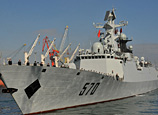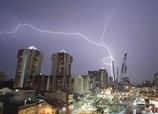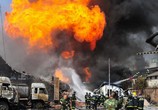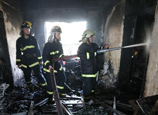
Lanzhou Party chief says change necessary to link with Europe
Though almost all of China's railways use the standard rail gauge adopted by 60 percent of railways in the world, the country should consider building a broad-gauge railway to facilitate cargo transport between China and Europe, a senior official said.
Yu Haiyan, Party chief of Lanzhou, capital of Gansu province, said in a recent interview in Beijing that laying a broad-gauge railway is necessary and will greatly help the economy in China's rapidly developing western region.
Almost all of China's railways use track with a gauge of 1,435 millimeters, but Russia and most of its neighboring countries use a broader track with a gauge of about 1,520 millimeters.
The difference in gauge has caused trouble for rail transport on the Eurasian corridor, which starts from Lianyungang in East China and goes to Europe via Central Asia.
The land corridor was supposed to shorten the time of shipping freight by rail, but because of the track gauge difference and other factors, Chinese trains have to stop at the border and freight is transferred to foreign trains for the rest of the trip west, he said.
Yu, who is heading the development of an experimental economic zone in Lanzhou, suggested that railway authorities should consider building a broad-gauge railway from the border to Lanzhou, a transport hub linking East and West since ancient times.
"With a broad-gauge railway, freight can be transported from Lanzhou to Amsterdam in just a week, compared with 40 days by sea from Guangzhou to Europe," he said.
Lanzhou is the ideal location to put one end of the broad-gauge rail line because "its distance from Guangzhou and other coastal areas of China is similar to its distance from the Alashankou Port", where cargo is moved from Chinese trains to foreign ones on the border, he said.
The proposed railway is part of the favorable policies that the Lanzhou New Area, China's fifth State-level new area but the first one in the underdeveloped western part of China, is trying to get from the central government. Other new areas include Shanghai's Pudong and Tianjin's Binhai.
Approved by the State Council last year, Lanzhou New Area, with an administrative area of 806 sq km, plans to have a GDP of 50 billion yuan ($7.88 billion) by 2015 and 270 billion yuan by 2030.
According to its website, the new area is expected to focus on developing sectors such as advanced equipment manufacturing, strategic emerging industries, petrochemical industries, and new energy and materials.
Its development is expected to benefit neighboring provinces and regions in China's developing western areas.
But the new area became well-known nationwide last year after a big construction company that participated in the infrastructure construction of the new area said some 700 hills will be flattened to allow developers to build the new area on the outskirts of the northwestern city.
Yu said that the construction company exaggerated about the "mountain-moving project", but he defended the development of the economic zone, saying the new area is not being built at the cost of arable land, forest, or the environment.
"Large amounts of land here are not suitable for developing agriculture, on some it is even impossible to grow grass. Many people have mistaken concepts about Lanzhou. The fact is that we didn't cut down trees to make room for industries," he said.
Among the many voices opposing Lanzhou's development of industries is Liu Fuyuan, a former high-level official at the country's National Development and Reform Commission, who was previously quoted by China Economic Weekly as saying the project was unsuitable because Lanzhou is often listed among China's most chronically parched cities.
Yu said Gansu province has a water shortage in general, but some parts of it have plentiful rainfall. Lanzhou has the Yellow River flowing through it, and there is enough water for developing industries.
"In fact, Lanzhou is more suitable for developing industries than agriculture," he said, adding that most of the soil is alkaline and cultivation on such land is "kind of a waste of water".
The new area will make better use of water resources, such as treating and recycling industrial water and using the reclaimed water for trees, he said.
In addition, the new area has banned enterprises that produce severe pollution, and the enterprises moved from old downtown Lanzhou to the new area have applied new technologies and products, he said.
As all these factors might pose difficulties for the inland city to attract 100 billion yuan in investment this year, the city's Party chief said Lanzhou has an energy advantage compared with the east.
"Enterprises often complained the electricity price is higher in East China than in Gansu, and sometimes the enterprises were given only certain periods of time to use electricity," he said.
"All these won't be a problem here," he said.
Latest development of H7N9 in China[Special]
















 Bird flu takes toll on poultry industry
Bird flu takes toll on poultry industry


![]()
